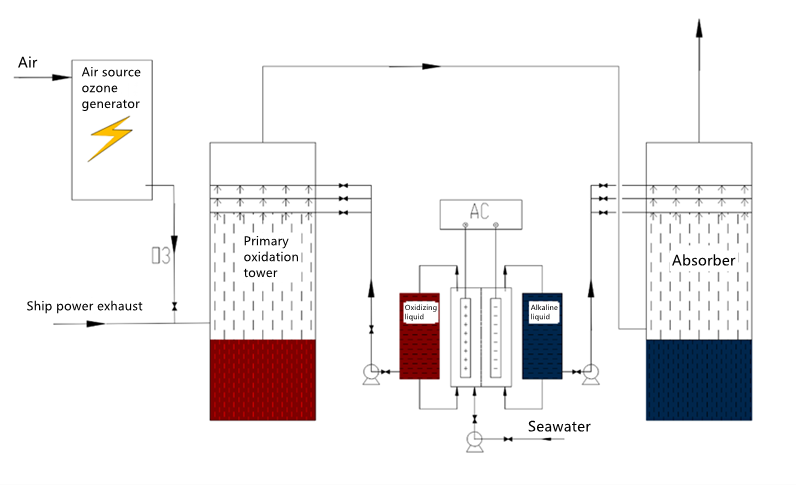Welcome to Qingdao Xiangtai Material&Energy Technology Co., Ltd.
Welcome to Qingdao Xiangtai Material&Energy Technology Co., Ltd.
 Products
Products Purification technology and eq
Purification technology and eq
Purification technology and
equipment for multi-pollutants of ship exhaust based on EGC in-situ O3/NaClO
Maritime transportation undertakes more
than 90% of my country’s international trade transportation volume, and 90% of
commercial ships use heavy fuel oil, which emits a large amount of NOx
(~20g/kW•h), SOx (~22g/kW•h), PM (~0.8g/ kW•h), contributing rates to the
concentration of NOx, SO2, and PM10 in the ambient air of coastal areas,
especially port cities, are as high as 10%~30%, 15%~50%, and 5%~37%, ocean-going
vessels have become the primary atmosphere reason of pollution.
The International Maritime Organization
(IMO) announced the amendment to “the International Convention for the
Prevention of Pollution from Ships” (implemented on January 1st, 2020) based on
the resolution MEPC.277(70) on October 28th, 2016, it is urgent to reduce the
emission of air pollutants from ships.
In my country's latest ship air pollutant
control policy (Issued by the Maritime Safety Administration of the Ministry of
Communications [2018] No.168), marine fuel oil is more stringent than IMO
requirements.
In the future, green emission commercial ships
will present three mainstream response measures, that is, use low-sulfur ship
combustion, or install tail gas purification measures to use high-sulfur ship
combustion, or use alternative fuels (such as liquefied LNG).
In view of the large price difference
between low-sulfur ship fuel and high-sulfur ship fuel and the use of
alternative clean fuels requires a comprehensive power system retrofit, the
installation of exhaust gas purification measures has become the most
competitive development direction of ship exhaust gas purification.
At present, in terms of ship exhaust gas
aftertreatment technology, single pollutant control technology is mostly used
internationally, such as particle trap (DPF) to control PM, selective catalytic
reduction (SCR) to control NOx, and wet seawater scrubbing technology (EGC)
Control SO2, but the above-mentioned technical combination has problems such as
complex system, large number of equipment, large area, difficult layout, high
investment operation cost, etc.
Therefore, combined with the development
trend of domestic and foreign ship exhaust gas treatment technology, it is
inevitable to realize the removal of multiple flue gas pollutants in the
limited space of ships. The EGC-based multi-pollutant collaborative control
technology developed by our company focuses on the three footholds of light
weight, high performance and stability of denitrification, sulfur removal and
dust removal equipment, to meet the development needs of green shipping.
Technical
features:
1)
O3/NaClO is prepared by in-situ air and seawater, no need to store desulfurizer
and denitrification reducing agent on board, and the operation is safe and
reliable.
2)
O3/NaClO synergistic oxidation of NO, electrolyte\seawater combined with
ex-situ stepwise absorption of NOx/SOx, low emission index for comprehensive
deep purification of flue gas with multiple pollutants.
3)
Flexibly adapt to the free switching working mode of the ship's power grid
load, and the system integration, reliability, flexibility, economy, and
environmental friendliness are significantly improved.
4)
Multi-purpose and multi-productive coupling, can simultaneously provide marine
protective gas and ship ballast water treatment agent, low comprehensive demand
for electric power, and great economic competitive advantage.